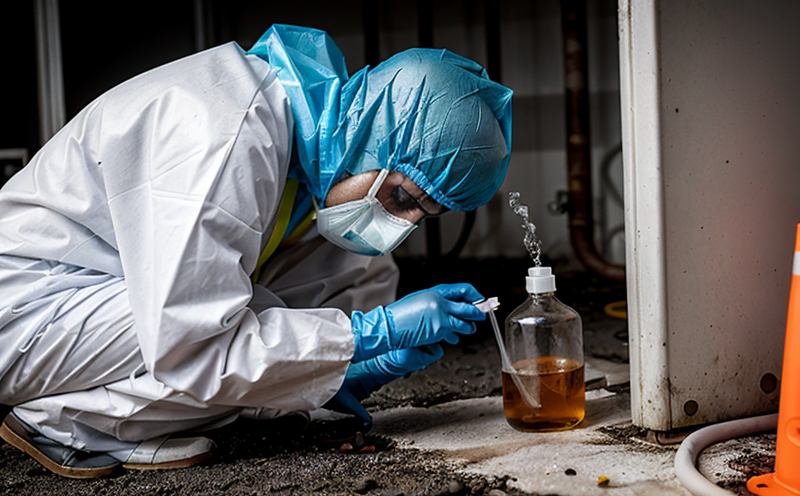ASTM D512 Chloride Ion Content Testing in Materials
The ASTM D512 standard provides a method for determining the chloride ion content in materials such as concrete, mortar, and other cement-based products. This test is critical for ensuring that these materials are not adversely affected by chloride ions, which can lead to corrosion of steel reinforcement bars in structures.
Chloride ions are introduced into construction materials through various sources including de-icing salts, seawater, industrial effluents, and even the atmosphere. The presence of chloride ions is a significant concern because they can react with reinforcing steel causing corrosion over time. This corrosion weakens structural integrity and shortens the lifespan of infrastructure.
ASTM D512 specifies a procedure using potentiometric titration to measure chloride ion content in samples. During this process, the sample is treated with silver nitrate solution until a pink color develops due to the formation of silver chloride precipitate. The endpoint is determined by observing when the color persists for 30 seconds.
This testing method ensures compliance with regulatory requirements and helps prevent potential failures in construction projects that could result from unchecked chloride ion levels. Compliance officers responsible for quality assurance will find this test particularly useful as it allows them to verify that their materials meet industry standards.
- Sample preparation involves grinding the sample into a fine powder if necessary, ensuring homogeneity.
- The titration process requires precise measurement of reagents and careful observation of color changes.
- Data interpretation follows strict guidelines outlined in ASTM D512 to ensure accurate results.
The precision and accuracy of this test are paramount given its role in protecting structural integrity. By adhering strictly to the procedures specified by ASTM D512, laboratories can provide reliable data that influences important decisions regarding material selection and use.
In summary, ASTM D512 chloride ion content testing is an essential tool for ensuring the longevity of infrastructure built with cement-based materials. It plays a crucial role in preventing costly repairs and replacements caused by premature deterioration due to chloride-induced corrosion.
Industry Applications
The ASTM D512 chloride ion content test finds application across various sectors including construction, transportation, and civil engineering where long-lasting infrastructure is paramount. Quality managers responsible for overseeing material procurement must ensure that the materials they select do not contain excessive levels of chloride ions which could compromise structural integrity.
In the transportation sector, particularly in regions experiencing harsh winters with frequent use of de-icing salts, this test ensures road and bridge structures remain corrosion-free. In civil engineering projects involving marine environments or areas prone to saltwater intrusion, ASTM D512 testing becomes indispensable for maintaining robust infrastructure.
R&D engineers benefit greatly from this testing method as it enables them to innovate safer materials capable of resisting chloride ion penetration better than existing products. For procurement teams, ensuring compliance with ASTM D512 helps guarantee that the suppliers they choose adhere to high-quality standards.
Customer Impact and Satisfaction
By adhering to ASTM D512 chloride ion content testing, customers experience several tangible benefits:
- Enhanced Durability: Ensures that materials used in construction are not susceptible to chloride-induced corrosion.
- Improved Safety: Reduces the risk of structural failures and related safety hazards.
- Economic Efficiency: Prevents costly repairs and replacements due to premature deterioration.
- Regulatory Compliance: Ensures adherence to industry standards, avoiding potential legal issues.
Satisfaction among clients is high as the results of ASTM D512 testing provide confidence in product quality. This testing method has become a cornerstone for ensuring reliable and safe infrastructure worldwide.
International Acceptance and Recognition
The ASTM D512 chloride ion content test enjoys widespread acceptance across numerous countries due to its stringent requirements and consistent results:
- United States: ASTM standards are widely recognized within the U.S., making ASTM D512 a trusted method for material testing.
- European Union: Many EU member states use ASTM D512 as part of their quality assurance protocols.
- Australia and New Zealand: These regions also incorporate ASTM standards into national regulations, including those pertaining to construction materials.
The international recognition of ASTM D512 highlights its importance in promoting global consistency in material testing. Laboratories that offer this service are well-positioned to serve a diverse range of clients globally while maintaining high-quality standards.





